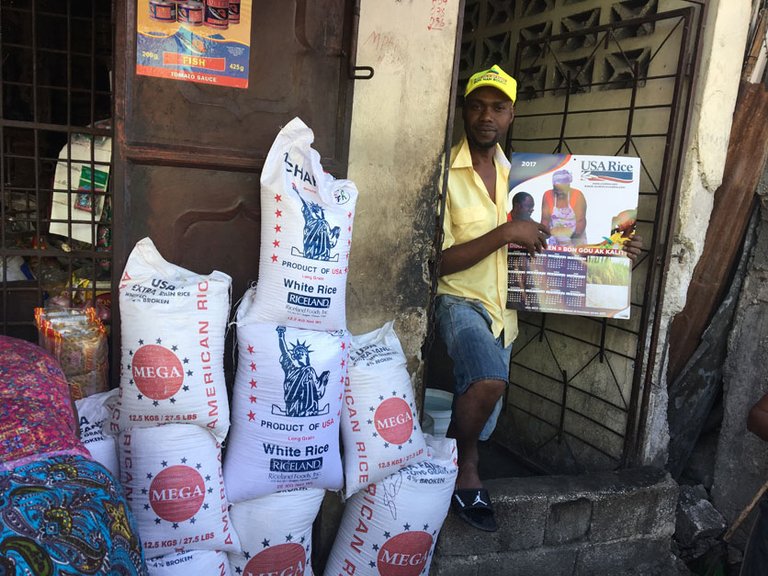
Image Source: https://www.agri-pulse.com/articles/18384-strife-in-haiti-halts-once-prosperous-us-rice-trade
I was disappointed to realize that my mindset about poverty and international aid before watching this video was incorrect. I’ve always thought that sending supplies and aid to poverty-stricken communities could only do good. I had never thought about the economic and entrepreneurial effects of providing resources, and the negative effect that they have. I am going on a trip to South Africa this summer with a group of business students to meet with companies to help them establish business plans, and I am interested to see how my perspectives will change even more. I know that this is not a country that is “behind” in business or technology, but I think that I will still get a taste of the economical differences that I don’t get to experience in the US. Below are some of my observations and realizations that I gained from the video.
Competitive Markets
By flooding local markets with gifts and donations, local markets are being destroyed. Local producers are put out of work, and competition is eliminated. Without the need for production, there is no competition. In the future, if international aid groups stop providing food or resources, markets will have to reestablish themselves. In the video, it is mentioned that farmers have stopped their work. If the markets have to reestablish themselves, these producers will have to start from zero. The time that it would take to restart production could cause a large disruption to the available supply.
The NGOs that continue to provide rice to Haitians have created a monopoly on the supply. There is no need for local farmers to produce their own because few people would want to pay for a product that they can receive for free. This monopoly has driven out local producers and eliminated the competition that would allow them to thrive.
Exchange of Goods
Social entrepreneurs have begun taking the place of regular entrepreneurs. By continuing to supply resources that can be produced locally, there is no need for entrepreneurs to come up with new ideas. The company in Haiti that produced solar panels was losing money that would be paid to local employees because the panels were being provided for free. These free gifts seem like a good idea to social entrepreneurs, but they are taking away from the opportunities of local entrepreneurs. These local entrepreneurs and businessmen producing resources for their communities and being paid by other people in the community are investing money back into their community by hiring and paying employees. By being given resources, free exchange is compromised. There is no exchange of goods when the supply comes from gifts. This lack of exchange hurts any small business that provides the same resources as the donations from international aid groups.
I liked that this video gave good examples of how people can provide international aid without hurting a community’s possibilities for entrepreneurship. The couple that started the jewelry business and hired locals was the best example to me. Allowing individuals to work and make their own money to spend it as they wish is the best way to promote the economy and well-being of a community. By supporting and allowing these people to support themselves, free exchange and entrepreneurship are able to thrive.
NGOs that Support Local Businesses
I’ve purchased handmade items from local craftsmen that are supported by a business like the one in the video. I didn’t think much of it at the time, but seeing the benefits of these businesses will definitely make me try to order more in the future. I also really liked the idea of Partners Worldwide, which supports local businesses. I think this represents the theme of promoting partnerism instead of paternalism. Many people are capable of coming up with business ideas, but support from organizations like Partners Worldwide can help them achieve them. While watching, I also thought about whether organizations like this help people sell their goods locally, or internationally as well. If local customers don’t want to purchase an item from a local business, because it can be provided to them for free, I hope that these organizations are able to help them sell their products in other areas.
Government and Agency Policies
I also thought that it was interesting that systems are in place to prevent people from getting loans for their businesses. This primarily affects people with small and medium-sized companies, especially if they don’t own land as collateral. This reminded me of the first article we read this semester about providing microloans in India. The organization that provided these loans offered them collateral-free. I think there should be an organization that provides loans like these for entrepreneurs wanting to start a business, but who do not own land. Banks and agencies in their countries are not providing them, so this could be a good goal for an NGO that would like to provide partnership over paternity.
There was a heavy emphasis in the video on policies and laws in countries that prevent poor people from getting out of their situation. Without connections or money, it is difficult to obtain the requirements or funds to start a business. I wish there were more recommendations on what can be done, besides their governments becoming less corrupt. I think the only aid that we can provide would be more organizations established to help and support local businesses.